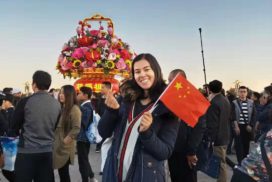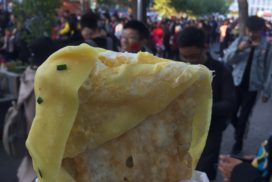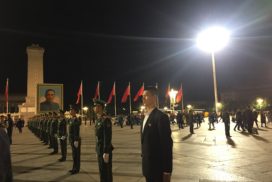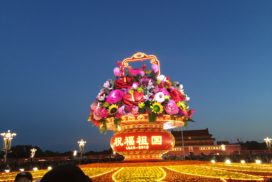China’s National Day at Tian’an Men Square = Most crowded place in China during busiest day of the year!
十一 (October 1st) is China’s national day and the beginning of the golden week (黄金周) – it is also notoriously known as China’s busiest travel period during the entire year. Seemingly everyone travels back to their home province for a family reunion and to enjoy the national holiday week with their loved ones. Cities such as Beijing and Shanghai are popular travel destinations for a family trip during the golden week and are hence not recommended for travel during China’s national day holiday. A famous Chinese proverb describes huge crowds of people with: 人山人海 which is literally translated into “people mountain people sea”.
Every morning at sunrise, there is a traditional flag-raising ceremony at Tian’an men square in Beijing. However, during 十一,the square is filled with thousands of Chinese tourists from all over the country who come to witness the special 3-minute flag-raising ceremony at 6:10 AM. Since I really wanted to experience this unique atmosphere, I dared to accept the challenge and get up in the middle of the night, walk to the square and wait for the sunrise, together with a couple of thousand people. While waiting for the sun to rise, we met some friendly peers who were curious to chat about life in Europe. It was a great way to practice Chinese, even though I didn’t manage to keep up with the speed of the conversation, especially at this hour, I still was able to contribute some of the differences between the German and Dutch culture.




After spending four weeks in China, intensively learning Chinese, I can produce a bunch of useful every-day life sentences regarding shopping, ordering food, getting directions and small talk about my major and hobbies. My biggest challenge at the moment, however, is the listening comprehension during a conversation: I am currently struggling with the speed and diverse vocabulary that Chinese native-speakers use when talking about their lives. Luckily, my language buddies at 北大(Peking University)are very patient and considerate with my limited speaking ability in Chinese. Our teacher told us to stay patient and not expect to be fluent overnight, her words were: “慢慢来” (mán mán lái) – a common Chinese saying that translates into something similar to “the time will come”.

For those of you who don’t know anything about Chinese, I will quickly introduce the basic components in the next paragraph.
In Chinese, there are four major tones used to distinguish words in the spoken language. The written language consists of words that are captured in independent characters. Mainland China uses simplified characters, while Hong Kong and Taiwan use the traditional characters, which contain even more strokes.
To help foreigners learn the language, a system called pinyin (拼音字母) was introduced in the 1950s by the Chinese government and well-known linguists. It essentially spells out the pronounciation for each character using four accents. Since the spoken language contains many similar sounds who are written exactly the same in Pinyin, it is not recommended to skip learning characters (汉字) if one wants to achieve fluency in Chinese.

Apart from knowing which word is meant, learning 汉字is also incredibly useful in everyday life in China, from reading street signs to using apps such as ordering just about anything on Taobao – China’s Ebay (淘宝). Most importantly, being able to read menus to order the right dishes is an essential survival skill in China.

Meeting my Chinese Language Buddies
This week I met my first language buddies in China and had a great time exchanging cultural differences between European and Asian countries with them. To ensure a fair exchange, my language buddies and I have managed our expectations and set a time frame for each language to make sure both partners get the opportunity to practice their foreign language. The actual time spent talking in each language depends on the foreign language level of my counterpart, the ones with more advanced speaking abilities would usually also speak more in their preferred foreign language. I find it so convenient to have lunch or dinner together on campus and a great way to practice languages with friends.
This week’s odd discovery
I would like to share surprising, unexpected or odd things that I experienced in China from my mostly western-culture-influenced perspective with you.
Crowded Canteen = Short Queuing Time?!

While the biggest canteen on the PKU campus is packed with students during lunch and dinner time (11:30-13:00 and 17:00-18:00), I somehow manage to get my full meal within less than five minutes. The food stalls and staff are incredibly efficient at managing the large number of people on a daily basis and serve your food within seconds to ensure everyone can have their meal before the next class starts. This is similar to the canteens that I have been to in Singapore and is one of the similarities that I have come to notice between the two countries.
Time is really running at this restaurant…
Also, the other day I was having a dinner with friends in a famous chain restaurant called 西贝筱面村. We ordered our dishes on WeChat and guess what, the waiter brought an hourglass filled with sand to time their speed and make sure all of our food would arrive within 25 minutes time. I was definitely impressed by this efficiency and in fact, our last dish did arrive just in time. Not sure what would happen if that wouldn’t have been the case though…great food either way and definitely worth a visit!


These were my odd discoveries this week, please take them with a pinch of humour as I am trying to capture my list of unexpected discoveries in China as long as my foreigner-point-of-view lasts. As time flies by and myself adjusting very quickly, I am worried the list will soon be challenging to fill with new discoveries. So stay tuned for the next episode of curious discoveries in and around Beijing!
I am looking forward to the next week at 北京大学.
See you later ~ 回头见 [huí tóu jiàn]!
